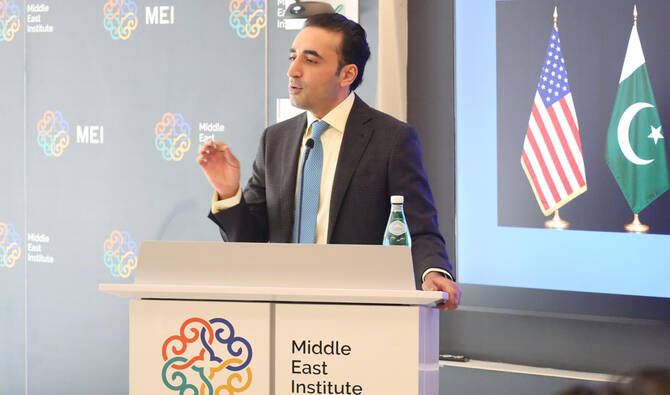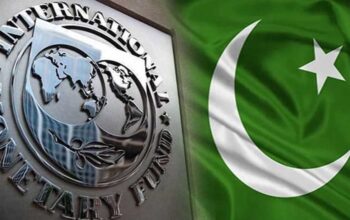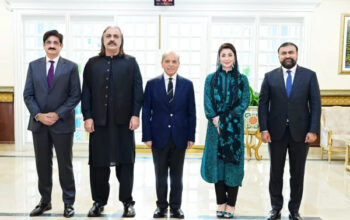By Staff Reporter
ISLAMABAD: Former foreign minister Bilawal Bhutto-Zardari said on Thursday India’s suspension of the Indus Waters Treaty risks sparking the world’s first nuclear war over water, escalating an already volatile standoff between the two nuclear-armed neighbours.
Speaking at the Middle East Institute in Washington, the chairman of the Pakistan Peoples Party (PPP) accused India of threatening Pakistan’s survival by shutting off its water supply, a move he called an “act of war” with global implications.
The Indus Waters Treaty, a 1960 World Bank-brokered pact, has governed the sharing of the Indus River system’s waters, assigning India control over the eastern rivers and Pakistan the western ones. Though it weathered decades of conflict, the treaty’s suspension by India, following a deadly April 22 attack in Pahalgam, occupied Kashmir, has plunged relations to a new low.
India blamed Pakistan for the attack, a claim Islamabad denies. In retaliation, Pakistan has closed the Wagah border, suspended trade with New Delhi, and held all bilateral agreements, including the Simla Agreement, in abeyance.
India targeted Pakistani civilian infrastructure in its Operation Sindoor. Pakistan’s military launched Operation Bunyan-um-Marsoos, a large-scale retaliatory operation targeting Indian military installations across multiple regions. Over the course of 87 hours, Pakistani forces downed six Indian fighter jets, including three advanced Rafale aircraft, and hundreds of drones.
The conflict, which ended with a US-brokered ceasefire on May 10, marked one of the most intense confrontations between the two nations in years.
“In the age of climate challenges that are to come, water scarcity and water wars used to be a theory,” Bilawal said. “India shutting off Pakistan’s water supply is laying the foundations for the first nuclear water war. We have said that cutting off our water supply would be an act of war.”
The warning came amid a high-stakes diplomatic campaign by Pakistan to rally international support and counter India’s lobbying efforts in the United States. A delegation led by Bhutto-Zardari, alongside former foreign ministers Hina Rabbani Khar and Khurram Dastgir, Senators Sherry Rehman, Musadik Malik, Faisal Sabzwari, and Bushra Anjum Butt, and senior envoys Jalil Abbas Jilani and Tehmina Janjua, is crisscrossing Washington, London, and Brussels. Their mission: to underscore Pakistan’s commitment to peace while warning of the catastrophic risks posed by India’s actions.
Bhutto-Zardari casts the treaty’s suspension as a life-or-death issue for Pakistan. “We don’t say it in a jingoistic manner. We don’t say it with any relish,” he said. “It is an existential crisis for us. Any country on the planet, no matter their size, their strength or their ability, would fight for their survival and fight for their water.”
He urged the United States and other nations to press India to honor the treaty, warning of a dangerous precedent. “You cannot allow this precedent to be set in the Pakistan context, because we’ll fight the first war, but it won’t be the last,” he said. “If India is allowed to cut off our water, that means that every upper riparian with hostilities to a lower riparian now has a carte blanche.”
Bhutto-Zardari criticised India’s refusal to cooperate on multiple fronts, including counterterrorism, Prime Minister Shehbaz Sharif’s offer to jointly investigate the Pahalgam attack, and US President Donald Trump’s mediation efforts. “All that means is there’ll be more terrorism, there’ll be more war, and there’ll be no peace,” he said. “The prime minister of India and his government may want to damn his people to this fate. I refuse to damn my people, and I refuse to damn the people of India to this fate.”
He pitched dialogue as a path forward. “Surely, India and Pakistan working together, we can eradicate terrorism from the subcontinent,” the former foreign minister said. “India and Pakistan working together can create that conducive environment in Kashmir where the people that live there can live free from oppression, suffocation, and actually see prosperity.”
The delegation’s visit to Washington included meetings with U.S. lawmakers, where Pakistani officials pressed for dialogue and a resolution to the Kashmir dispute, which Bilawal described as an “unfinished agenda of the United Nations.” They met with Congressmen Jack Bergman and Tom Suozzi, co-chairs of the Congressional Pakistan Caucus, as well as Democratic Representative Ilhan Omar and Republican Ryan Keith Zinke, emphasising that “sustainable peace in South Asia hinged on dialogue, restraint and a just resolution of the Kashmir dispute, rather than unilateralism or intimidation.”
Bhutto-Zardari briefed lawmakers on India’s “recent acts of unprovoked aggression,” including civilian targeting and the treaty suspension, which he called “deeply concerning.”
He praised Trump’s role in de-escalating tensions, noting his “constructive role in helping de-escalate tensions and supporting efforts towards a ceasefire.”
The PPP chief casts the conflict as a burden on future generations. “Now they’re damning my generation, future generations, not only to fight over Kashmir, not only to go to full-out war whenever there’s a terrorist attack, but now we’re damning future generations of Indians and Pakistanis to fight over water,” he said. “I refuse to damn the people of my country and I bear no ill will to the people of India.”
Earlier this week, the delegation met with U.N. Secretary-General Antonio Guterres and Security Council members in New York, while another team, led by Special Assistant Syed Tariq Fatemi, visited Moscow.
Meanwhile, Defence Minister Khawaja Asif warned that the 1972 Simla Agreement with India has lost its “sanctity” due to New Delhi’s unilateral actions, including its move to suspend the Indus Waters Treaty.
“The [Simla] agreement was bilateral […] as no third party or the World Bank was involved,” Asif told a local television, asserting that without the treaty, the Line of Control in Kashmir would revert to a mere ceasefire line.
The Simla Agreement, signed in the aftermath of the 1971 war between Pakistan and India, set out principles to guide their bilateral relations, including a commitment to respect the ceasefire line in the disputed region of Kashmir. The Indus Waters Treaty, a separate pact brokered by the World Bank in 1960, governs the sharing of the vital Indus River system’s waters between the two nations. Both accords have long served as cornerstones of stability in a region marked by hostility.
“A party could not unilaterally terminate the treaty,” Asif said, dismissing India’s claim that it could obstruct the flow of water at its own discretion. He warned that if tensions persist, “agreements between both countries would hold no significance or value.”
The defence minister’s blunt assessment reflects growing alarm in Islamabad over India’s actions, which Pakistan views as a direct threat to the fragile status quo. The suspension of the Indus Waters Treaty, in particular, has raised concerns about the potential for economic and environmental fallout in a region where water is a lifeline for millions.
Copyright © 2021 Independent Pakistan | All rights reserved




